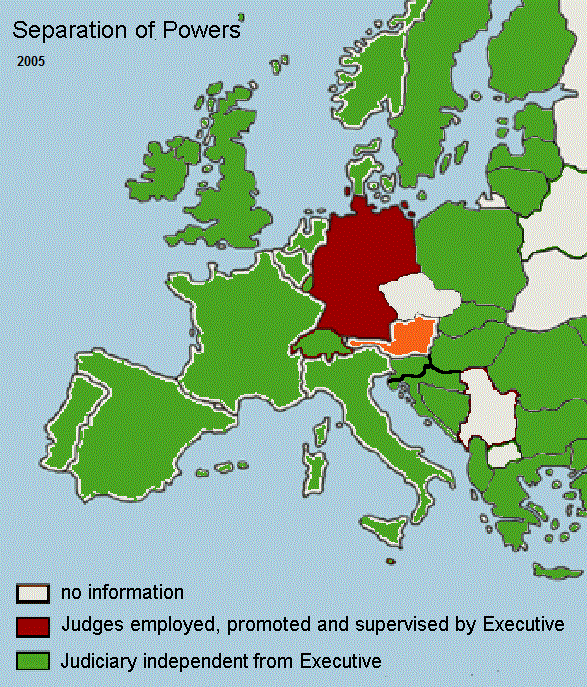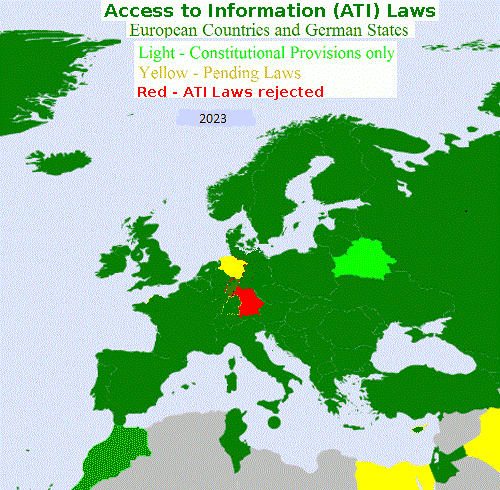Complains to EU about Human Right violations in Germany have often been
answered by pointing to the European Court of Human
Rights. I have filed the complaint Keim v. Germany. Appl. No. 41126/05 on 11.
November 2005. The decision on admission is not yet done and from other cases I
assume that it will take at least 5 more years for the case to be decided
on.
Article 6 (1) of THE TREATY ON EUROPEAN UNION says:
"The Union is founded on the principles of liberty,
democracy, respect for human rights and fundamental freedoms, and the rule of
law, principles which are common to the Member States."
Therefore it is totally unacceptable that Germany violates Human rights.
The advice of EU to complain to the ECHR does not help, because it takes so many
years. In child cases national courts may take 5 to 10 years. Only after having
used national courts it is possible to complain to the ECHR which may again take
5 to 10 years. Obviously the German welfare office (Jugendamt) cannot be
corrected by the ECHR because it takes so long time.
Why does German administration and justice system violate human
rights systematically and ignore ECHR decisions?
EU tries to secure democracy and human rights by demanding this from new
members. However Germany is a founding member and lacks e. g. the following
which new members must have:
If Germany would seek membership today this would not be accepted. However
Germany was a founding member and was never asked to comply with modern
democracy and giving a guarantee of protecting human rights. Germany could veto
if EU would pressure for strengthening human rights acceptance.
How long will EU continue to tolerate these violations of modern democracy
(including freedom of information and independent judiciary) and respect for
human rights?
The report of the Commissioner of Human Rights of the Council of Europe on
his visit to Germany October 2006 suggests that German Human Rights Institute
should monitor human rights and the development of national action plan on human
rights (Appendix E):
* Point 35. (...) With regard to legal studies at
universities, the Commissioner notes with regret that international human rights
law appears to be often taught as an optional part alone. He encourages the
German universities to integrate human rights in the core curricula of legal
studies. (...) The Commissioner also stresses the importance of training judges
and prosecutors working in courts at L�nder and local levels on the European
Convention on Human Rights in order to strengthen its direct national
implementation. The Commissioner is aware of the involvement of the Federal
Ministry of Justice in the development of the new Council of Europe Programme
for Human Rights Education for Legal Professionals (HELP) and he encourages
German authorities to take an active part in its
implementation.
* Point 46: Extending the infrastructure
of human rights education would further strengthen the integration of human
rights into professional career tracks. The Commissioner encourages the
incorporation of human rights as a core component in professional training in
law enforcement, for teachers as well as practitioners in the social and health
sectors. In addition, government officials in general, as well as
parliamentarians on federal and state levels, would benefit from human rights
training adapted to their area of work.
* Recommendation
2. Consider the establishment of parliamentary human rights committees at L�nder
level.
* Recommendation 3. Promote the independence of
extrajudicial complaints bodies, when possible, and ensure that complaints are
handled on the basis of clear procedures.
* Recommendation
5. Strengthen the mandate of the German Institute for Human Rights with regard
to structural and factual monitoring and in respect to its consultative role in
the process of drafting legislation with human rights
relevance.
* Recommendation 7. Consult, in a systematic
and regular manner, civil society organisations working in the field of human
rights on legislation and policies which impact human
rights.
* Recommendation 9. Develop the national action
plan on human rights as a co-ordinated process for the continuous improvement of
human rights protection in Germany by involving all stakeholders and setting out
clear policy aims and strategies on how to reach them.
I have suggested to implement these suggestions to German Federal Ministry
of Justice (Appendix 14), German Federal Parliament Bundestag (Appendix 15) and
parliament in the state Baden-W�rttemberg (16), Bavaria, Saxony-Anhalt, Lower
Saxony, Saxony, Berlin, Brandenburg, Rhineland-Palatine, Nordrhein-Westfahlen
and Hesse. However the experience of writing petitions over the last 10 years
(Appendix 13) shows that EU has to tell Germany to implement these improvements.
Otherwise it will not happen.
Sincerely,
Enclosure:
1. Committee on Civil Liberties, Justice and Home Affairs,
meeting on 17. December 2007:
http://www.europarl.europa.eu/meetdocs/2004_2009/organes/libe/libe_20071217_1500.htm
with PE390.381v02-00 PR Draft report ANGELILLI "Towards an EU strategy on the
rights of the child"
2. Deutsche Jugend�mter missachten
Recht auf Familie Kindern, Eltern und Gro�eltern:
http://openpr.de/news/139648/Deutsche-Jugendaemter-missachten-Recht-auf-Familie-Kindern-Eltern-und-Grosseltern.html
3. EU-Petitionskommission in Br�ssel beschlie�t Initiativbericht zum
deutschen Jugendamt:
http://www.openpr.de/news/140173.html
4. Human Right Violations in Germany: Freedom of Opinion, Information,
Association, Family Life and Right to Fair Trial:
http://wkeim.bplaced.net/files/de_human_rights.htm
5. Petition to German parliament on violations of human rights:
http://wkeim.bplaced.net/petition_me-en.htm
6. Udo Hochschild: GEWALTENTEILUNG IM DEUTSCHEN BEWUSSTSEIN. Versuch einer
Kritik:
http://web.archive.org/web/20140107004837/http://www.gewaltenteilung.de/einf_druck.htm
(English translation:
http://wkeim.bplaced.net/files/defamation.htm)
7. Human right of access to public documents (information):
http://wkeim.bplaced.net/foi.htm
8. The Protagonists of an infantile Cult of Honor. Germany risks the Wrath of
the Council of Europe with her arbitrary and childish "Insult" Laws by Peter
Briody, institut voigt:
http://www.eucars.de/images/stories/insult_eng.pdf
9. Eskalationsdynamik in der Systemkritik-Auseinandersetzung w�hrend des
Forschungsverlaufes "Systemkritik: Deutsche
Justizverbrechen"
in den Gerichtsbezirken
Wilhelmshaven und Oldenburg Verteidigung des Systems durch Systemakteure:
http://www.systemkritik.de/bmuhl/forschung/wilhelmshaven_oldenburg/wilhelmshaven_oldenburg.html
10. CEED - Conseil Europ�en des Enfants du Divorce. Parents, children and
grandparents victims of international and administrative child abductions:
http://www.jugendamt-wesel.com/CEED_eng.htm,
http://video.google.de/videoplay?docid=6930682099028697936,
http://video.google.de/videoplay?docid=4805041562057469063
11. 8.4.2004: CHAMBER JUDGMENT IN THE CASE OF HAASE v. GERMANY:
http://www.echr.coe.int/eng/Press/2004/April/ChamberJudgmentHaasevGermany08042004.htm
12. Human Rights Violations in Germany: Peter Briody, institut voigt:
http://www.eucars.de/violatio/essay/violaeng.htm,
http://beschwerdezentrum.org/_kommentar/Briody/
und
http://www.eucars.de/images/stories/beleidigung_de.pdf
13. 1997- 2007: Petitions on Freedom of Information, Human Rights and Citizen
Rights:
http://wkeim.bplaced.net/petitions.htm
14. 11. August 2007: Letter to German Ministry of Justice to implement
suggestions of the Commissioner of Human Rights of the Council of Europe:
http://wkeim.bplaced.net/files/0708bmj.htm
15. 21. August 2007: Petition to German Bundestag to implement suggestions of
the Commissioner of Human Rights of the Council of Europe:
http://wkeim.bplaced.net/petition_gg.htm
16. 28. September 2007: Petition to parliament of Baden-W�rttemberg to implement
suggestions of the Commissioner of Human Rights of the Council of Europe:
http://wkeim.bplaced.net/files/petition_bw-mg.htm
17. Germany does not respect Article 8 of the European Convention on Human
Rights and Fundamental Freedoms (ECHRFF) family rights:
http://wkeim.bplaced.net/files/familyrights.htm
Appendix:


